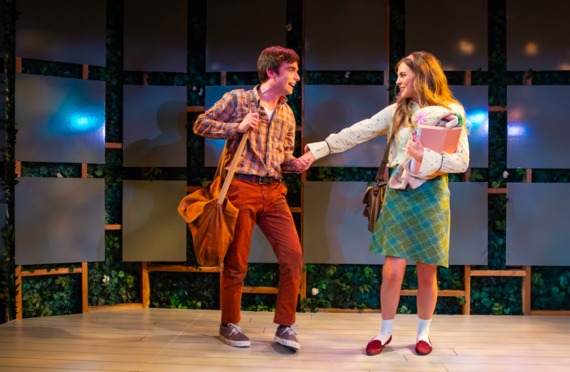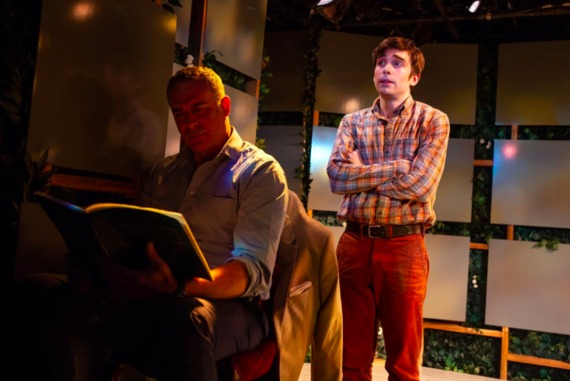This month The Irish Repertory Theatre in Manhattan are staging two Brian Friel one-act plays that explore love and the tales people tell themselves to make sense of their lives. It's the hottest new ticket off-Broadway.
In 2018 it's instructive to remember just what a keen critic the younger Brian Friel was of modern Irish society.
The 1960s were the decade that formally introduced us to his genius, but his later plays are so layered and multifaceted that we can sometimes forget how so much of his early focus zeroed in on small-town Ireland and its soul-crushing privations and hypocrisies.
This week The Irish Repertory Theatre is staging two one-act plays by the Irish master, Winners and The Yalta Game. The first play was written early in Friel's career and the second one toward the end.
Both are forensic and fairly chilly explorations of the necessary fictions that people weave in order to give their lives some meaning (a career-long preoccupation of Friel's).
Oscar Wilde once said that nothing in life interested him but the mask. He was referring to the mask people wear to conceal or reveal their private selves. Living as a semi closeted gay Irishman at the height of Victorian England, he knew all about the gap between what was allowed and what was actually happening. In fact, he literally embodied it.
Friel looked at Irish society with a similar kind of dual awareness, The Rep's new productions remind us.
The first play of the evening is Winners, which is directed by Conor Bagley and stars Aoife Kelly, Phill Gillen, Jenny Leona and Aidan Redmond. The first two actors play a pair of young lovers and the latter two act as their narrators, supplying us with key details about the young couple's background and commenting on their fate.
The basic structure of Winners suggests a younger Friel trying to find a theatrical form to fit his dueling impulses, the first being to craft an intimate character study of two not exactly quite star crossed lovers and the second being a distinctly cooler sociological and psychological examination of the community and nation that has produced them.

Phil Gillen and Aoife Kelly in Irish Rep's TWO BY FRIEL- LOVERS, WINNERS
That dual impulse was used to unforgettable effect in Friel's breakthrough play Philadelphia, Here I Come! but in this short but compelling one act, it's far less effective, because Friel gives neither of the two characters Joe and Mag much time to emerge as independent beings.
Aoife Kelly seems to know this culture and community in her bones (interestingly its County Tyrone, not Friel's usual County Donegal) and she brings authenticity and pathos to the proceedings, portraying a young woman who is trying her damnedest to elude all the demands that her society is placing on her as best she can.
As her boyfriend, the only son of a man the locals consider a layabout, Phil Gillen has also deeply embedded his character in the rural community from which he springs. His Joe is already chafing under his rapidly dwindling opportunities to make something of himself and both the actor and Friel's script make you feel it.
Mags has clearly backed the wrong horse, aligning herself with a young man who is dreaming of a future that doesn't star anyone but himself, and Joe, in turn, feels trapped by her unexpected pregnancy and is furiously resentful of what it might mean for his plans.

Phil Gillen and Aidan Redmond in Irish Rep's Two By Friel
That kind of conflict of interest has tragedy written all over it and soon enough the two narrators inform us that the lovers' fates are already sealed. It doesn't come as a terrific shock to us though because Friel has already telegraphed that they live in a community that's so indifferent to their hopes and dreams that in fact, they cannot even see them.
This, on its face, is already pretty dark stuff but Friel goes even further. The landlord who leases the young couple's first apartment runs a slaughter house, we learn. He signs the lease over the hide of a cow he is about to shoot. His carelessness is so complete it's breathtaking and the intimation is stark, this young couple will soon be at the mercy of a society full of unforgivably careless people.
There are strong echoes of Gar Public and Gar Private in Winners, the two sides of one of Friel's most famous characters, on both Joe and Mag. They are both capable of great consideration and great cruelty, and their tragic flaw is that they are so consumed with their individual plans of escape (Joe to another life, Mag to a married life) that they talk right past each other.
The Yalta Game, also directed by Bagley, is the second and it must be said more satisfying one act play of the evening and it's based on a short story by Anton Chekhov (the Russian writer that Friel is most often compared to). In it we meet Dmitry (Aidan Redmond) a man in his early forties who is summering at the famous vacation spot on the Black Sea. But summering is a bit of an understatement, he's actually in full flight from his wife, children and professional life.

Jenny Leona and Aidan Redmond in Two By Friel
On his second to last day in the place, he spots Anna (Jenny Leona) a young woman in her early 20's out walking her little dog through town on her own. Dmitry is instantly besotted and determines to seduce her.
In other hands, this could be the story of a cynical rotter who exploits the innocence of an impressionable girl. But in Friel's hands, the hunter is soon every bit as ensnared as the prey. To woo Anna, Dmitry introduces her to the Yalta game of the play's title: how he likes to make up dramatic stories to explain the lives and demeanors of their fellow vacationers.
Soon Anna is inventing back stories for everyone she sees out walking along the promenade as enthusiastically as Dmitry. And soon after that, she is falling into Dmitry's arms, where she's quickly stricken with guilt over cheating on her own absent and we discover frequently unwell husband.
Once again Friel is contemplating the often disorientating distance between what we owe to ourselves and what we owe to love. He's also fascinated with the fictions we weave in order to keep on living and he's ruthless in outlining how these fictions can reject life just as easily as they embrace it.

Both of these tough as nails plays comment searingly on the thorny relationships between women and men, and in particular, they reflect on the way that desire can unmoor a life and damage it beyond repair.
Redmond inhabits his character so deeply that he achieves instant authority from the opening scene. His Dmitry is too cool for school and gets his comeuppance when his conquest turns out to conquer him.
Neither he nor Anna can outrun the snares set for them by the waiting world, though. All we may have of love, Friel shows us, is in the few blissful moments we can snatch between taking action and encountering the consequences.




Comments